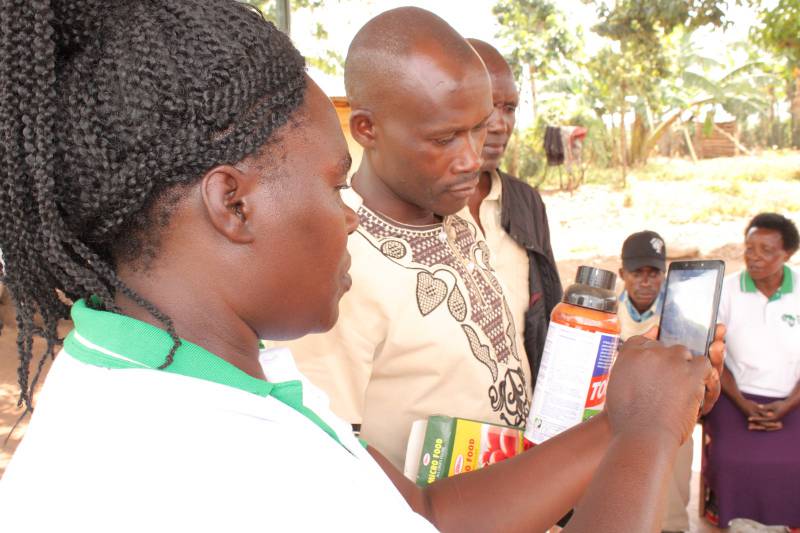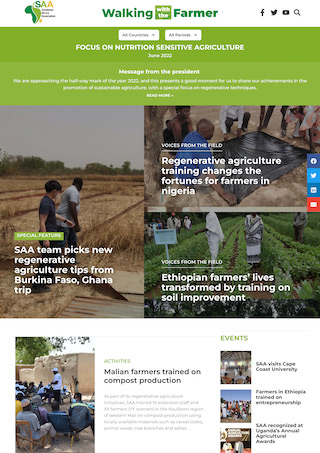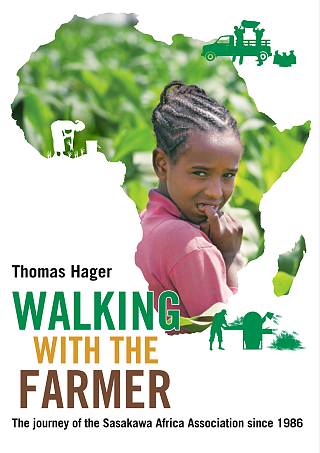Revolutionizing Farming: Digital Transformation in Kansambya Parish with Ezyagric Mobile App

Revolutionize Farming Practices with Ezyagric
In Lutete Village, Madudu Subcounty, Mubende District, Aisha Nakibule, a 44-year-old mother of ten, exemplifies the struggles of smallholder farmers in Uganda. Facing poor soil quality and low productivity, she was among the 80% of Uganda's population reliant on agriculture for their livelihoods. The Sasakawa Africa Association (SAA) with the fund from the Nippon Foundation addressed these challenges by introducing Ezyagric, a digital platform that simplifies access to agricultural inputs. SAA trained Aisha and other Community-Based Facilitators (CBFs) to use the platform, equipping them with mobile phones pre-installed with Ezyagric and skills to diagnose pests and diseases. This initiative transformed Aisha into a local champion, training over 300 farmers in Kansambya Parish on using the app.
Before this intervention, smallholder farmers in Mubende struggled with low crop yields due to insufficient access to reliable and high-quality agricultural inputs. Many traveled long distances to find reputable suppliers, often encountering costly and counterfeit products. Through Ezyagric, Aisha facilitated the purchase of agricultural inputs for over 300 farmers in Kansambya Parish. In the first season of 2024 alone, she coordinated the purchase of inputs worth UGX 26 million (6,922 USD), including essential products like Weedmaster, Weedup, and Bio Grow. This collective ordering and timely delivery of inputs within seven days revolutionized farming practices in the area.
"The collective ordering system has been a game changer. We save on costs and get quality inputs delivered on time," Aisha noted.
 Farmer purchasing agricultural supplies from Aisha
Farmer purchasing agricultural supplies from AishaFarmers' Success Stories with Ezyagric
The impact of this digital intervention was profound. Farmers like Namuli Dorothy, a 41-year-old mother of seven, saw remarkable improvements in their crop yields. Dorothy's bean harvest increased from one bag per acre to seven bags, and her maize yield rose from four bags to eleven bags per acre. "I used to struggle to get just one bag of beans from an acre, but now, with the right inputs and guidance, I harvest seven bags. It's transformed my ability to support my children's education," she shared.
Munyebanza Teo, a 37-year-old father of seven, also benefited greatly. Learning Regenerative Agriculture (RA) practices and judicious fertilizer application through SAA, he no longer needed to spend UGX 20,000 (6 USD) on transport to Mubende town for inputs. His acre of maize produced 18 bags, beans yielded 15 bags per acre, and Irish potatoes reached 22 bags per acre. "The improved yields have made me a role model in my community. Neighbors often ask for my advice on which fertilizers and pesticides to use," Teo said.
Abomugisha Innocent, a 75-year-old farmer from Lutete, witnessed similar benefits. With timely access to inputs through Aisha, his maize yield reached 10-15 bags per acre, and his beans produced over seven bags per acre. "Access to timely inputs has made a huge difference. I can now get up to 15 bags of maize per acre," he remarked.
Aisha's Role to Empower Farmers Around Her
Aisha's role as a CBF has been transformative, strengthening her management skills and enhancing her ability to source inputs and outputs. This has led to improved farming outcomes and empowered hundreds of farmers around her. Additionally, she earns UGX 200,000 (54 USD) as a stipend from Ezyagric sales, reinforcing the broader socio-economic benefits of the initiative. "The extra income from Ezyagric helps me pay school fees for my children or cover household expenses," Aisha shared.
Despite the success, challenges remain, such as low levels of input sales due to business seasonality, poor weather conditions affecting farmer perceptions, and high employment turnover. Aisha highlights the crucial role of input stockists in improving access to quality agricultural inputs in Uganda and suggests that developing smaller, affordable packaging can effectively meet the demands of rural farmers.
SAA's Commitment to Bring About Positive Change in Farmers
SAA's initiative in facilitating access to agricultural inputs through Ezyagric underscores the effectiveness of combining digital tools with community-based training and support to transform agricultural practices. Farmers in this region have reaped better harvests and improved their livelihoods. This model holds promise for wider application, potentially transforming farming communities across Uganda and beyond. As we move forward, we remain committed to refining and expanding our initiatives to bring about positive change in more farming communities.
Retrieved from SAA E-Newsletter, issued in June 2024, titled "Focus on Uganda"
SAA Publications

E-newsletter
"Walking with the Farmer"
SAA publishes a bimonthly e-newsletter reporting on SAA activities.

SAA history book
"Walking with the Farmer: The journey of the Sasakawa Africa Assoication since 1986"
This book chronicles the history of SAA from its inception to the present.

Annual Report
Annual Report FY2023
Annual Report FY2023 is available here.





